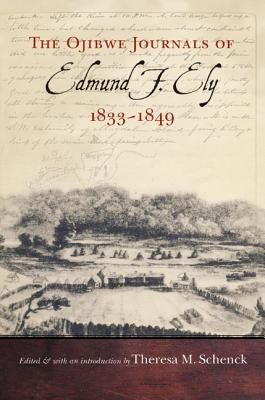
- We will send in 10–14 business days.
- Author: Edmund F Ely
- Publisher: University of Nebraska Press
- ISBN-10: 0803271409
- ISBN-13: 9780803271401
- Format: 15.2 x 23.1 x 4.3 cm, hardcover
- Language: English
- SAVE -10% with code: EXTRA
Reviews
Description
Twenty-four-year-old Edmund F. Ely, a divinity student from Albany, New York, gave up his preparation for the ministry in 1833 to become a missionary and teacher among the Ojibwe of Lake Superior. During the next sixteen years, Ely lived, taught, and preached among the Ojibwe, keeping a journal of his day-to-day experiences as well as recording ethnographic information about the Ojibwe. From recording his frustrations over the Ojibwe's rejection of Christianity to describing hunting and fishing techniques he learned from his Ojibwe neighbors, Ely's unique and rich record provides unprecedented insight into early nineteenth-century Ojibwe life and Ojibwe-missionary relations. Theresa M. Schenck draws on a broad array of secondary sources to contextualize Ely's journals for historians, anthropologists, linguists, literary scholars, and the Ojibwe themselves, highlighting the journals' relevance and importance for understanding the Ojibwe of this era.
Edmund F. Ely (1809-1882) spent sixteen years as a missionary and teacher among the Ojibwes of Lake Superior during the 1830s and 1840s.
Theresa M. Schenck is an associate professor of life sciences communications and American Indian studies and folklore at the University of Wisconsin-Madison. She is the author of William W. Warren: The Life, Letters, and Times of an Ojibwe Leader (Nebraska, 2007) and the editor of William W. Warren's History of the Ojibway People: The Annotated Edition.
EXTRA 10 % discount with code: EXTRA
The promotion ends in 9d.04:11:55
The discount code is valid when purchasing from 10 €. Discounts do not stack.
- Author: Edmund F Ely
- Publisher: University of Nebraska Press
- ISBN-10: 0803271409
- ISBN-13: 9780803271401
- Format: 15.2 x 23.1 x 4.3 cm, hardcover
- Language: English English
Twenty-four-year-old Edmund F. Ely, a divinity student from Albany, New York, gave up his preparation for the ministry in 1833 to become a missionary and teacher among the Ojibwe of Lake Superior. During the next sixteen years, Ely lived, taught, and preached among the Ojibwe, keeping a journal of his day-to-day experiences as well as recording ethnographic information about the Ojibwe. From recording his frustrations over the Ojibwe's rejection of Christianity to describing hunting and fishing techniques he learned from his Ojibwe neighbors, Ely's unique and rich record provides unprecedented insight into early nineteenth-century Ojibwe life and Ojibwe-missionary relations. Theresa M. Schenck draws on a broad array of secondary sources to contextualize Ely's journals for historians, anthropologists, linguists, literary scholars, and the Ojibwe themselves, highlighting the journals' relevance and importance for understanding the Ojibwe of this era.
Edmund F. Ely (1809-1882) spent sixteen years as a missionary and teacher among the Ojibwes of Lake Superior during the 1830s and 1840s.
Theresa M. Schenck is an associate professor of life sciences communications and American Indian studies and folklore at the University of Wisconsin-Madison. She is the author of William W. Warren: The Life, Letters, and Times of an Ojibwe Leader (Nebraska, 2007) and the editor of William W. Warren's History of the Ojibway People: The Annotated Edition.


Reviews